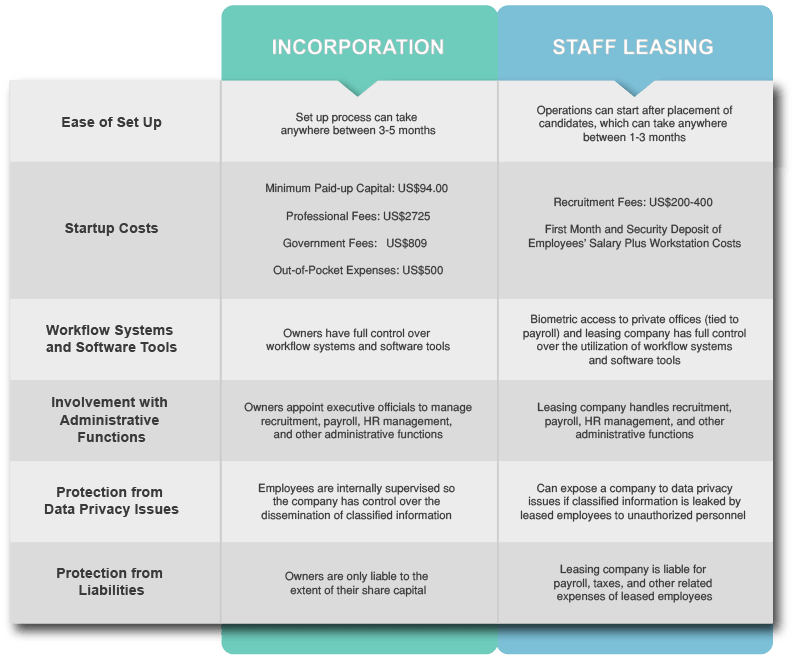
Outsourcing Options in the Philippines: Incorporation vs. Staff Leasing
Many companies outsource their back-office, customer support, and technical job functions to third-party providers in the Philippines. Initially, they fully outsource these operations to companies like Accenture, Convergys, TeleTech and other global business process management providers throughout Metro Manila to take advantage of low labor costs.
The Philippines has become a prime outsourcing destination, and companies looking for cost-effective business options that provide more control over their offshore staff look to Staff Leasing or incorporating their own company in the Philippines to manage their back-office work.
Company Incorporation
Incorporation is an attractive option for foreign companies that want to outsource operations to the Philippines to save long-term labor costs. It helps them centralize their back-office job functions in a country with an English-speaking and cost-effective workforce so they can focus more on their in-house business operations abroad.
Compared to other outsourcing models, incorporating your own company gives you more control over your offshore operations. It grants you the freedom to integrate your company’s established systems and tools into your offshore office in the Philippines.
However, incorporation has high startup costs and requires a lengthy setup process. The initial budget for the setup process includes business consulting fees, government registration fees, and permits and licenses from applicable agencies (for regulated industries). But the minimum paid-up capital in the Philippines, for an export enterprise, is US$94.00, comparatively cheaper than those of other countries.
Another large and upfront cost to consider is choosing your office location and office build-out as well as your office equipment, furniture, and technology. You can avail of alternative office space options to cut costs, such as coworking spaces or serviced offices.
But all these expenses are outweighed by the long-term cost savings that incorporating your own company and having your own employees provide.
Company incorporation in the Philippines is regulated by the Securities and Exchange Commission (SEC) and subject to compliance with appropriate government agencies on taxation, physical location, employee compensation, benefits, etc.
The entire setup process usually takes 3-5 months, depending on the length of time you accomplish requirements and the time it takes for government agencies to review your application.
Staff Leasing
Staff Leasing is a business arrangement where the client utilizes the recruitment, payroll, HR, and office facilities of a Staff Leasing provider (known as a leasing company) to source, recruit, and monitor payroll and HR management of a virtual team of professionals that performs work for the client.
Staff Leasing has a 5-step process:
- Client provides their requirements
- Leasing company sources for qualified candidates
- Client interviews potential employees (via Skype, phone or face-to-face)
- Leasing company onboards chosen candidates within their own facilities and provides them with workstations, office equipment, etc.
- Leased employees directly report to the client abroad while the leasing company handles their payroll and HR management
This outsourcing model is utilized by foreign companies that want to lessen their labor costs by outsourcing their back-office and administrative operations to an offshore team of professionals in the Philippines – which has more than 50% lower salary rates compared to their counterparts in affluent Western countries.
The setup process for a Staff Leasing arrangement is usually quick and convenient. The leasing company provides the necessary resources that leased employees need, such as but not limited to the following:
- Workstations in a private office
- Office equipment
- Internet connection
- IT support
- Access to common areas (pantry, multifunctional rooms, and recreational rooms)
However, Staff Leasing providers have fixed rates on the services they provide, and though these rates may be less expensive, they are not cost-effective in the long run compared to incorporation. This outsourcing model is ideal for companies that are looking for short-term cost reductions but not for those that prefer to cut costs long-term.
Incorporation vs. Staff Leasing: Which One is Better Suited For Your Business?

If you are looking to establish cost-effective labor operations in the Philippines for long term and have more control over your offshore employees and operations, then incorporation would be ideal for you.
But if you are hesitant to invest a large amount of capital and effort in setting up your own back-office operations and only want to avail of low labor costs by offshoring job functions to a virtual team in the Philippines, then you should consider Staff Leasing.
A common practice for some companies is to incorporate their own back-office support after availing the services of a Staff Leasing provider for a set period of time, usually for at least six (6) months. Some companies engage with Staff Leasing providers to test the waters and determine if outsourcing to the Philippines is ideal for their business.
Others do it to acquire access to a qualified team of professionals in the Philippines and eliminate the burden of sourcing and onboarding talent after incorporation by migrating their leased employees to their new company (there are Staff Leasing providers that allow this kind of setup, such as KMC Solutions, SourceFit, and Staff Virtual).
Both have their individual advantages and disadvantages but ultimately, your business needs will determine your preference on which business model to utilize.
